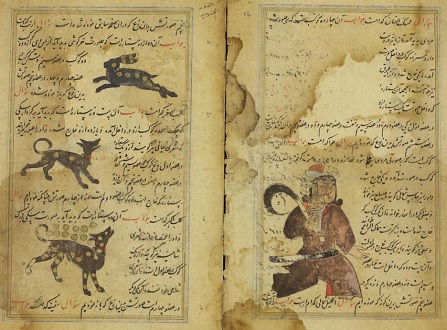RA was born in 1931, Vienna. The family included a brother eight years older than her, her mother, her grandmother and two aunts. Her mother was orphaned at a young age. RA's father went to Palestine in 1933, most likely because of economic reasons, and the family was supposed to join him. She has no memory of him. Nevertheless, her childhood was happy. One of her aunts was working in a factory and supporting the family. This aunt raised her and was closer to her than her own mother. She went in Vienna to a Jewish school for less than a year before the Anschluss, when the Jewish children stopped going to school. The children got no explanations. She noticed the fear and tension of the adults. Then she first became aware of Anti-Semitism. The Hitlerjugend kids used to pelt Jewish kids on their way to school. She was mugged by them. The family had to move to a Jewish neighborhood. Hitlerjugend kids once tied her to a pole. Her brother came and untied her after a while, but afterwards she never left the house alone. Swastikas were painted on the roads; the aged were taken away. She lived under this regime March 1938-June 1939, when she went to England on a Kindertrasport. Her aunt went in 39 to the USA. RA was invited in a letter to a Catholic family in Holland. Her grandma tore the letter. Her family was observant. She went eventually to a Christian family in Sheffield, England. She thought she was sent away because she did not behave properly. The family to whom she was sent did not understand German and she did not understand English. "I felt like the bottom fell out of my world and I was drowning". She couldn't stop crying. Then she had to adapt, to become a completely different person, because the family she lived with was so different from her biological family. ; In September 1939 she and the family's daughter were sent to a village because Sheffield was considered a war-target. After Christmas they returned home. She lived then under two different identities: the little refugee Jew from Austria. They wanted her to convert but no-one forgot that she was Jewish. In her secular life, at school, she was an English girl, like everyone else in her class. She was accepted and popular. She had no contact with her mother in Vienna because she could not write to her from an enemy country. She considers this time in terms of contact with her past as amputation. Her only contact was with her aunt in America. She had a good life in England despite of the war, Blitz, nights in air-raid shelters etc., and feels lucky. She stayed with them for 7 years, until she was 15. The family was not allowed legally to adopt her because she had a living relative, her aunt in the States, where she went against her will. Again she had to separate from her family and start a different life. Her mother died in Auschwitz. She does understand some German but cannot stand the language. In the States she lived with her aunt and uncle in Williamsburg. Another culture shock: a Christian girl living in an ultra-orthodox Jewish neighborhood. ; Not knowing the local religious regulations and restrictions, she did everything wrong. She was lonely, stayed alone for many hours in the apartment, lonely at school, different accent. She could not speak Yiddish like everyone around her. She decided, reluctantly, to stay Jewish, because she was born Jewish, and so was her dead family. After school she got a job, and got married at 21. They adopted two girls, and a daughter was born 10 years later. She feels she had a disrupted life. She was not overprotective. She never told her daughters about her childhood, until the youngest forced her to, because she did not want to sadden them. She does not consider herself a child-survivor. She now considers herself completely Americanized. She still suffers from separation anxiety of family and friends who move away. Only in the past three years has she met others with similar experiences.
| כותר |
Kestenberg Archive. |
|---|---|
| כותרים נוספים |
ארכיון קסטנברג |
| יוצרים נוספים |
Prince, R OHD (interviewer) פרינס, ר OHD (מראיין) המדור לתיעוד בעל פה של מכון המחקר ליהדות זמננו ע"ש אברהם הרמן באוניברסיטה העברית בירושלים (בעלים נוכחיים) |
| שנה |
1994 |
| הערות |
Digitization has been made possible through the generosity of the Fondation pour la Memoire de la Shoah and the Conference on Jewish Material Claims Against Germany, Inc. Box 14, Folder 14-11, CDR00150 המדור לתיעוד בעל פה של מכון המחקר ליהדות זמננו ע"ש אברהם הרמן באוניברסיטה העברית בירושלים (257)14-11 |
| מקום נוסף |
April 3 1994. |
| היקף החומר |
56 p. |
| מתוך |
Kestenberg Archive |
| שפה |
אנגלית |
| קרדיטים |
המדור לתיעוד בעל פה של מכון המחקר ליהדות זמננו ע"ש אברהם הרמן באוניברסיטה העברית בירושלים |
| מספר מערכת |
990044243640205171 |
בכל שימוש יש לציין את מקור הפריט בנוסח הבא:
המדור לתיעוד בעל פה של מכון המחקר ליהדות זמננו ע"ש אברהם הרמן באוניברסיטה העברית בירושלים
תנאי השימוש:
למחקר, לימוד והוראה
מותר להעתיק את הפריט ולהשתמש בו למטרות של לימוד עצמי, הוראה ומחקר בלבד.
מותר להעתיק את הפריט ולהשתמש בו גם למטרות הוראה ומחקר מסחריות.
חובה להעניק קרדיט ליוצר/ים בכל שימוש בפריט.
אסור לפגוע בכבודו או בשמו של היוצר באמצעות סילוף או שינוי של היצירה.
אין צורך לפנות לספרייה הלאומית לקבלת רשות שימוש למטרות לימוד עצמי הוראה ומחקר.
שימוש שאינו ללימוד עצמי, הוראה ומחקר, מותנה בקבלת הרשאה מבעל זכויות היוצרים בפריט ו/או מבעל האוסף. לא נדרש אישור נוסף מהספרייה הלאומית.
ניתן לפנות לספרייה הלאומית לקבלת פרטי הקשר של בעל זכויות היוצרים/בעל האוסף: טופס בקשה לבירור זכויות יוצרים
מידע נוסף:
הפריט כפוף לזכויות יוצרים ו/או לתנאי הסכם.
תנאי השימוש נקבעו בהסכם עליו חתמה הספרייה הלאומית.
אם לדעתך נפלה טעות בנתונים המוצגים לעיל או שקיים חשש להפרת זכות יוצרים בפריט, אנא פנה/י אלינו באמצעות טופס בקשה לבירור זכויות יוצרים
תצוגת MARC
יודעים עוד על הפריט? זיהיתם טעות?

 כניסה עם גוגל
כניסה עם גוגל
 כניסה עם פייסבוק
כניסה עם פייסבוק




